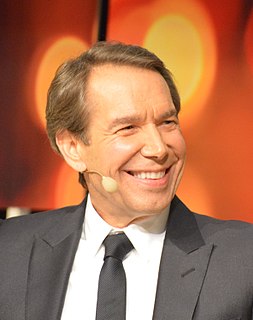A Quote by Jeff Koons
I don't think irony is about judgment; I think irony is something like, "Oh, that's interesting," because it's not something I think one starts off to achieve. I think it's just something that presents itself. And if it does, I find it's usually optimistic, not negative in its terms.
Related Quotes
There's something about us using the word fascism and thinking about, "What is it? What does it mean, and what are the tenets of it?" I've been thinking a lot about folks denying what has happened in history, or just not acknowledging it. I think there's something that's fascist, and something that I think we could probably learn from, in terms of the energy in the world right now.
I think there's something to the millennial sentiment of being, like, 'I'm great.' But I think there's also something really amazing and powerful about being, like, 'Oh, hey, I'm awesome.' It's a fine line. But I think it's possible to be both, to not be the most annoying person in the world, to still be very intriguing and fun to watch.
I feel like you have to earn something with an audience. If I just did it now, I think producers on any superhero movie, I think they wouldn't trust me to do it the way I'd want to do it, because I'd want to do something basically really strange. I think you have to earn that freedom to do stuff like that. So I think, if I keep kind of chipping away, trying to do good movies and interesting, strange movies then people will eventually trust you to do that on a bigger scale.
Of course, you can never watch something like somebody else watches something like you, but nonetheless, you have to try. So I think on camera you learn a lot about how much the camera does for you, which is what is the great luxury of movie acting. Or acting whether it's TV or movies or whatever it is, that the camera's really such a gift because there's so much that it sees and does if you're willing to just be open and expose yourself and all of that. So you also learn what doesn't matter. And sometimes when you think about things, you think things matter that don't matter.







































